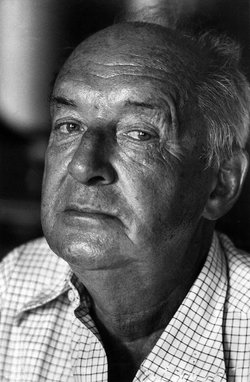

Queer Places:
Cimetière de Clarens-Montreux
Montreux, District de la Riviera-Pays-d’Enhaut, Vaud, Switzerland
 Vladimir Vladimirovich Nabokov[b]
(22 April [O.S. 10 April] 1899[a] –
2 July 1977), also known by the pen name Vladimir Sirin, was a Russian and
American novelist, poet, translator and entomologist. His first nine novels
were written in Russian (1926–38), but he achieved international prominence
after he began writing English prose. Nabokov became an American citizen in
1945.
Vladimir Vladimirovich Nabokov[b]
(22 April [O.S. 10 April] 1899[a] –
2 July 1977), also known by the pen name Vladimir Sirin, was a Russian and
American novelist, poet, translator and entomologist. His first nine novels
were written in Russian (1926–38), but he achieved international prominence
after he began writing English prose. Nabokov became an American citizen in
1945.
Vladimir was a confirmed homophobe, and his gay brother, Sergei, was a constant source of shame, confusion and regret to him. But Sergei is also a crucially important figure in his brother's work, a presence with whom Nabokov grappled, in different ways and with different degrees of success, throughout his lengthy oeuvre. When he learned of Sergei's death in 1945, Nabokov was in the middle of writing "Bend Sinister," his most political novel. Like Sergei, the hero of "Bend Sinister" speaks out against a brutally repressive regime, and like Sergei, he would pay for his courage with his life. But Nabokov's feelings about his brother were never simple: In "Bend Sinister" it's not the hero who's gay but the dictator who orders his death. In 1967, when he finally told the story of Sergei's life, Nabokov's writing conveys a sense of unspoken strain and remorse: "For various reasons," he writes, "I find it inordinately hard to speak about my other brother."
In "Ada," his longest novel and one of his last, Nabokov made his best and final attempt to come to terms with his feelings about his brother in print. "Ada" is the story of an incestuous love affair between Van Veen and Ada Veen, brother and sister. Their younger sister, Lucette, is also passionately in love with Van, and she spends most of the novel trailing around after the couple, getting in the way and generally making a pest of herself. Van's indifference drives Lucette to despair, and toward the end of the book she throws herself from a cruise ship in the middle of the Atlantic. Brian Boyd, who is probably the single greatest living authority on Nabokov, believes that the real inspiration for Lucette was Sergei. "The centrality of Lucette in 'Ada,'" he argues in an e-mail, "in some ways seems to reflect Nabokov's sense of Sergei: the non-favorite, the frail one beside his confident sibling, the concentration camp victim ... the one we're invited to ignore, and even want to dismiss from the story, but eventually realize we should never have overlooked."
Nabokov's Lolita (1955) was ranked fourth in the list of the Modern Library 100 Best Novels in 2007;[6] Pale Fire (1962) was ranked 53rd on the same list; and his memoir, Speak, Memory (1951), was listed eighth on publisher Random House's list of the 20th century's greatest nonfiction.[7] He was a finalist for the National Book Award for Fiction seven times.
Nabokov was also an expert lepidopterist and composer of chess problems.
My published books: